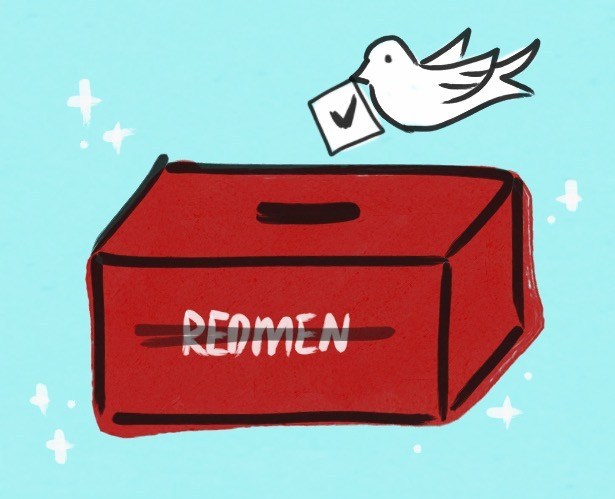On Apr. 12, Principal and Vice-Chancellor Suzanne Fortier announced her intention to change the name of the men’s varsity sports teams in an email to the McGill community. The men’s sports teams will be referred to as ‘the McGill teams’ during the 2019-20 season and a committee will choose a new name by Sept. 2020.
“Inclusion and respect are at the core of our University’s principles and values; pejoratives run contrary to who we are as a community,” Fortier wrote. “For these reasons, the Redmen name is not one that our community would choose today, and it is not one that McGill should carry forward into our third century.”
While controversy has surrounded the former name for years, the recent string of efforts demanding a change from McGill’s administration began in 2016, after the Truth and Reconciliation Commission of Canada (TRC) published a report documenting the history of the residential school system in Canada. The TRC included 94 calls to action in their report, several of which were addressed to universities and included asking schools to develop more Indigenous history and cultural studies courses and programs.
Following the release of the report, McGill launched the Task Force on Indigenous Studies and Education which, in turn, formed the Working Group on Principles of Commemoration and Renaming. In Dec. 2018, the Working Group recommended that “McGill should alter its commemoration or naming practices where the harm outweighs the good.”
Fortier later announced that she would take the Winter 2019 semester to decide whether or not to pursue the idea. Aneeka Anderson, an Inuk U1 Arts student, was overwhelmed when she learned the outcome of Fortier’s decision.
“Hearing that the Redmen name will be changed was an emotional moment for me, as it was for many,” Anderson said. “I reached out to my best friend instantly, and when I finally saw her that night, we just hugged and cried. I felt safety, relief, and, most importantly, so proud to be Indigenous. This campaign was led with unbelievable strength, grace, and a steadfast belief in justice for Indigenous peoples. Nothing could make me more proud.”
The name change comes after months of protests on campus led by members of the Indigenous community. On Oct. 31, the Student Society of McGill University’s (SSMU) Indigenous Affairs Committee led a rally outside of the James Administration Building to demonstrate against the continued use of the name. The event was followed by a referendum question on the SSMU Fall 2018 Referendum ballot, asking whether McGill students would support a change to the men’s team’s name: With a historic turnout of over 23,000 students, 79 per cent of McGill students voted against the name’s continued use. SSMU responded by releasing an open letter in support of a name change and immediately began lobbying McGill’s administration. Ella Martindale, co-chair of the Indigenous Student Alliance and a member of the Cowichan First Nation, gave credit to the leadership of Indigenous groups at McGill.
“I’m so grateful for the Indigenous leaders, like […] Jirousek who has worked on this particular campaign, and I’m also grateful for the Indigenous students and leaders who came before who fought for space for us to pursue this issue,” Martindale said. “I’m not particularly grateful toward McGill, because I think this is only a small step, but I am so proud of the students here that have worked to get rid of the name, and some of that work was breaking down walls and making McGill listen to us.”
Next semester, Fabrice Labeau, interim deputy provost student life and learning, will form and lead a committee that will choose a new name. According to Fortier’s letter, the committee will be made up of both administrative staff and McGill athletes. Tomas Jirousek, SSMU’s Indigenous affairs commissioner and a member of the Kainai First Nation, hopes that McGill will continue to fulfill its commitment to truth and reconciliation.
“There [are] a few concrete ways McGill can move towards meeting its commitment to both the Provost’s Task Force on Indigenous Education as well as the TRC,” Jirousek wrote in a message to the Tribune. “I’d like to see the administration commit to hiring Indigenous professors straight into tenure track positions, currently we have one, commit to the expansion of the Indigenous studies major, and work toward establishing an Indigenous presence in central governing bodies such as the Senate and the BoG.”








